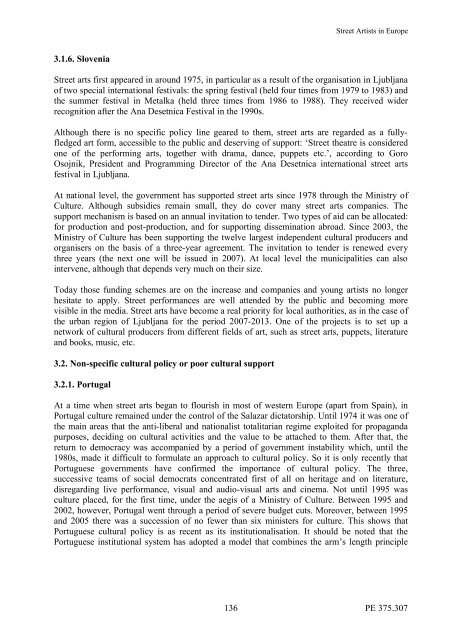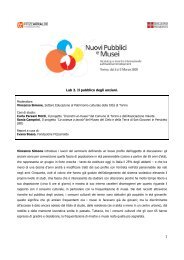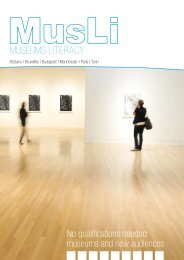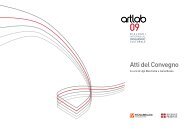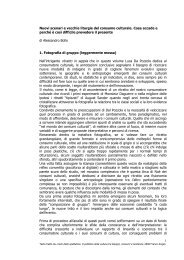STREET ARTISTS IN EUROPE - Fondazione Fitzcarraldo
STREET ARTISTS IN EUROPE - Fondazione Fitzcarraldo
STREET ARTISTS IN EUROPE - Fondazione Fitzcarraldo
Create successful ePaper yourself
Turn your PDF publications into a flip-book with our unique Google optimized e-Paper software.
3.1.6. Slovenia<br />
136<br />
Street Artists in Europe<br />
Street arts first appeared in around 1975, in particular as a result of the organisation in Ljubljana<br />
of two special international festivals: the spring festival (held four times from 1979 to 1983) and<br />
the summer festival in Metalka (held three times from 1986 to 1988). They received wider<br />
recognition after the Ana Desetnica Festival in the 1990s.<br />
Although there is no specific policy line geared to them, street arts are regarded as a fullyfledged<br />
art form, accessible to the public and deserving of support: ‘Street theatre is considered<br />
one of the performing arts, together with drama, dance, puppets etc.’, according to Goro<br />
Osojnik, President and Programming Director of the Ana Desetnica international street arts<br />
festival in Ljubljana.<br />
At national level, the government has supported street arts since 1978 through the Ministry of<br />
Culture. Although subsidies remain small, they do cover many street arts companies. The<br />
support mechanism is based on an annual invitation to tender. Two types of aid can be allocated:<br />
for production and post-production, and for supporting dissemination abroad. Since 2003, the<br />
Ministry of Culture has been supporting the twelve largest independent cultural producers and<br />
organisers on the basis of a three-year agreement. The invitation to tender is renewed every<br />
three years (the next one will be issued in 2007). At local level the municipalities can also<br />
intervene, although that depends very much on their size.<br />
Today those funding schemes are on the increase and companies and young artists no longer<br />
hesitate to apply. Street performances are well attended by the public and becoming more<br />
visible in the media. Street arts have become a real priority for local authorities, as in the case of<br />
the urban region of Ljubljana for the period 2007-2013. One of the projects is to set up a<br />
network of cultural producers from different fields of art, such as street arts, puppets, literature<br />
and books, music, etc.<br />
3.2. Non-specific cultural policy or poor cultural support<br />
3.2.1. Portugal<br />
At a time when street arts began to flourish in most of western Europe (apart from Spain), in<br />
Portugal culture remained under the control of the Salazar dictatorship. Until 1974 it was one of<br />
the main areas that the anti-liberal and nationalist totalitarian regime exploited for propaganda<br />
purposes, deciding on cultural activities and the value to be attached to them. After that, the<br />
return to democracy was accompanied by a period of government instability which, until the<br />
1980s, made it difficult to formulate an approach to cultural policy. So it is only recently that<br />
Portuguese governments have confirmed the importance of cultural policy. The three,<br />
successive teams of social democrats concentrated first of all on heritage and on literature,<br />
disregarding live performance, visual and audio-visual arts and cinema. Not until 1995 was<br />
culture placed, for the first time, under the aegis of a Ministry of Culture. Between 1995 and<br />
2002, however, Portugal went through a period of severe budget cuts. Moreover, between 1995<br />
and 2005 there was a succession of no fewer than six ministers for culture. This shows that<br />
Portuguese cultural policy is as recent as its institutionalisation. It should be noted that the<br />
Portuguese institutional system has adopted a model that combines the arm’s length principle<br />
PE 375.307


